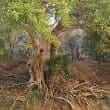Background
- The Pygeum africanum (African plum) tree is a tall evergreen of the family Rosaceae found in central and southern Africa. Its bark has been used medicinally for thousands of years. Traditional African healers have used the bark to treat bladder and urination disorders, particularly symptoms associated with benign prostatic hypertrophy (BPH), which is an enlarged prostate. Historically, the bark was powdered and used to make a tea, which was taken by mouth for these conditions.
- The African plum tree has become endangered due to the demand for its bark to process Pygeum africanum extract.
- The majority of trials conducted since the 1970s report improvements in BPH symptoms, including frequency of nighttime urination, urine flow rate, and left over urine volume, with the administration of Pygeum africanum bark extract. This research has led some credibility to the common use of this agent in Europe for BPH. The herb is less commonly used in the United States where prescription drugs or the herb saw palmetto is more commonly used.
References
- Berges RR, Windeler J, Trampisch HJ, et al. Randomised, placebo-controlled, double-blind clinical trial of beta- sitosterol in patients with benign prostatic hyperplasia. Beta- sitosterol Study Group. Lancet 6-17-1995;345(8964):1529-1532.
View Abstract - Brackman F, Autet W. Once and twice daily dosage regimens of Pygeum africanum extract (PA): a double-blind study in patients with benign prostatic hyperplasia (BPH) [abstract]. J Urology 1999;161(4S):361.
- Breza J, Dzurny O, Borowka A, et al. Efficacy and acceptability of tadenan (Pygeum africanum extract) in the treatment of benign prostatic hyperplasia (BPH): a multicentre trial in central Europe. Curr Med Res Opin 1998;14(3):127-139.
View Abstract - Chatelain C, Autet W, Brackman F. Comparison of once and twice daily dosage forms of Pygeum africanum extract in patients with benign prostatic hyperplasia: a randomized, double-blind study, with long-term open label extension. Urology 1999;54(3):473-478.
View Abstract - Dedhia RC, McVary KT. Phytotherapy for lower urinary tract symptoms secondary to benign prostatic hyperplasia. J Urol 2008 Jun;179(6):2119-25.
View Abstract - Donkervoort T, Sterling A, van Ness,J, et al. A clinical and urodynamic study of tadenan in the treatment of benign prostatic hypertrophy. Eur Urol 1977;3(4):218-225.
View Abstract - Edwards JL. Diagnosis and management of benign prostatic hyperplasia. Am Fam Physician 2008 May 15;77(10):1403-10.
View Abstract - Hutchison A, Farmer R, Verhamme K, et al. The efficacy of drugs for the treatment of LUTS/BPH, a study in 6 European countries. Eur Urol 2007;51(1):207-15; discussion 215-6.
- Ishani A, MacDonald R, Nelson D, et al. Pygeum africanum for the treatment of patients with benign prostatic hyperplasia: a systematic review and quantitative meta-analysis. Am J Med 12-1-2000;109(8):654-664.
View Abstract - Krzeski T, Kazon M, Borkowski A, et al. Combined extracts of Urtica dioica and Pygeum africanum in the treatment of benign prostatic hyperplasia: double-blind comparison of two doses. Clin Ther 1993;15(6):1011-1020.
View Abstract - Melo EA, Bertero EB, Rios LA, et al. Evaluating the efficiency of a combination of Pygeum africanum and stinging nettle (Urtica dioica) extracts in treating benign prostatic hyperplasia (BPH): double-blind, randomized, placebo controlled trial. Int Braz J Urol 2002;28(5):418-425.
View Abstract - Natural Standard Research Collaboration, Chief Editors: Ulbricht C, Basch E, Natural Standard Herb and Supplement Reference - Evidence-Based Clinical Reviews, USA: Elsevier/Mosby, 2005.
- Shenouda NS, Sakla MS, Newton LG, et al. Phytosterol Pygeum africanum regulates prostate cancer in vitro and in vivo. Endocrine 2007;31(1):72-81.
View Abstract - Strong KM. African plum and benign prostatic hypertrophy. J Herb Pharmacother 2004;4(1):41-46.
View Abstract - Wilt T, Ishani A, Mac Donald R, et al. Pygeum africanum for benign prostatic hyperplasia (Cochrane Review). Cochrane Database Syst Rev 2002;(1):CD001044.
View Abstract







